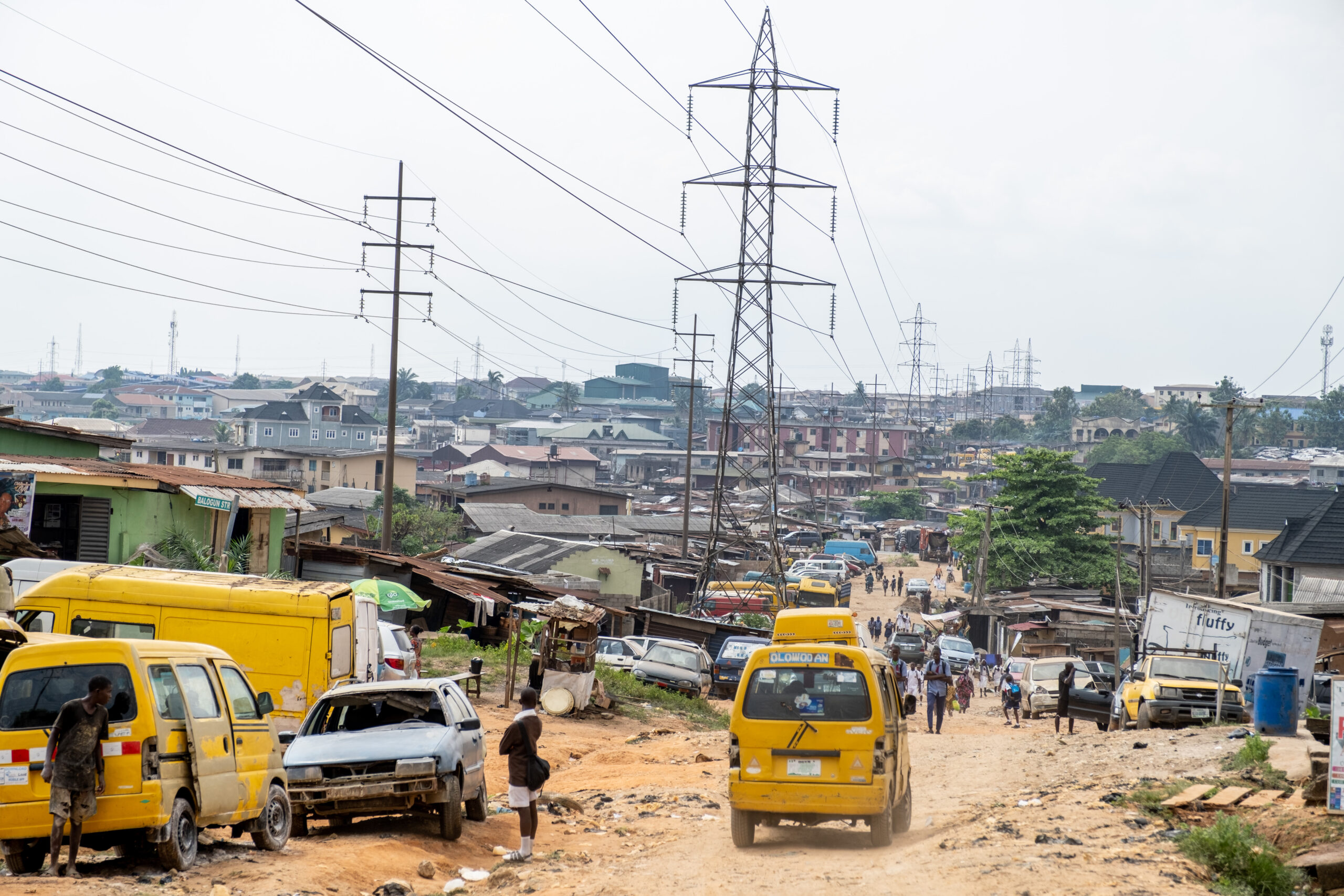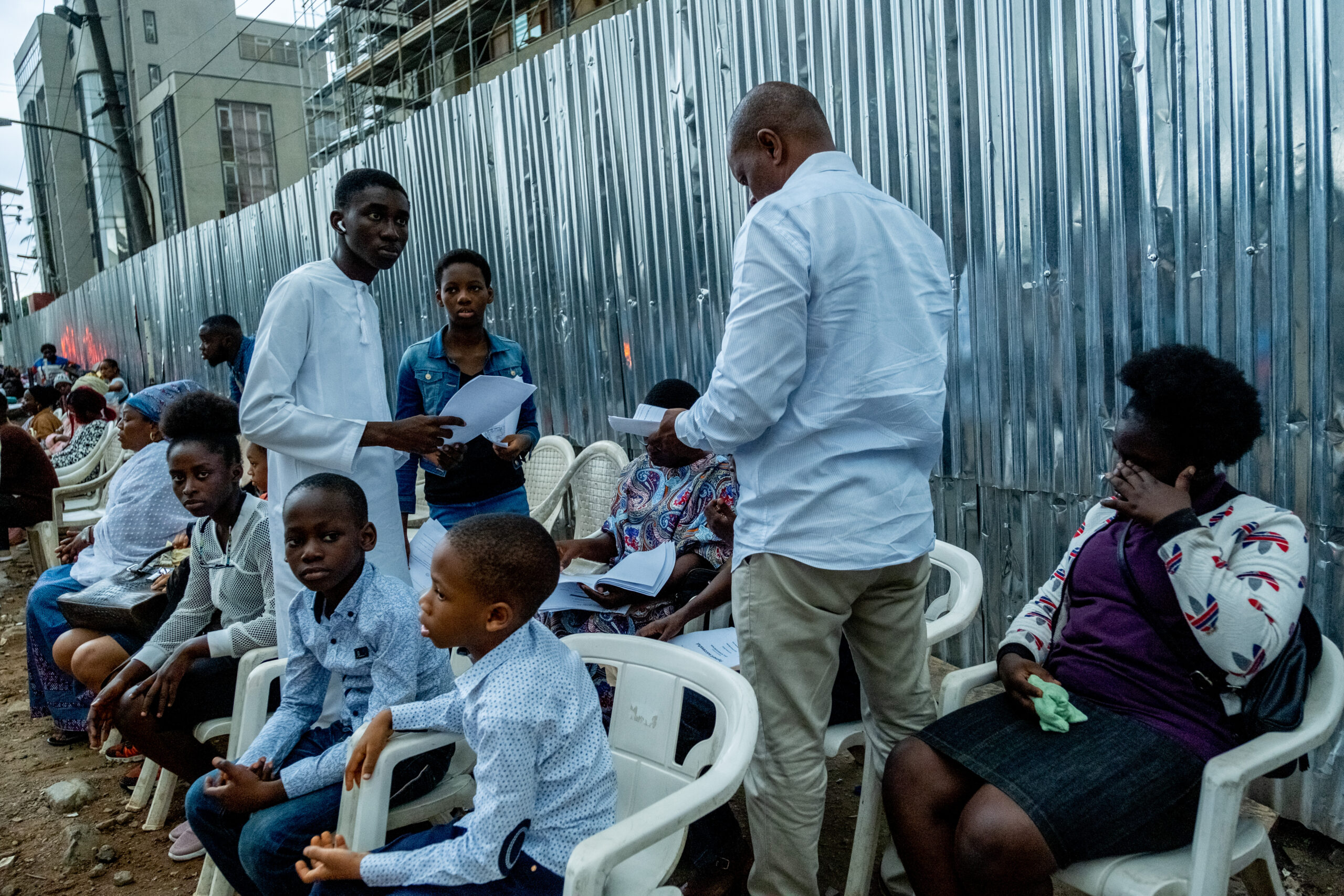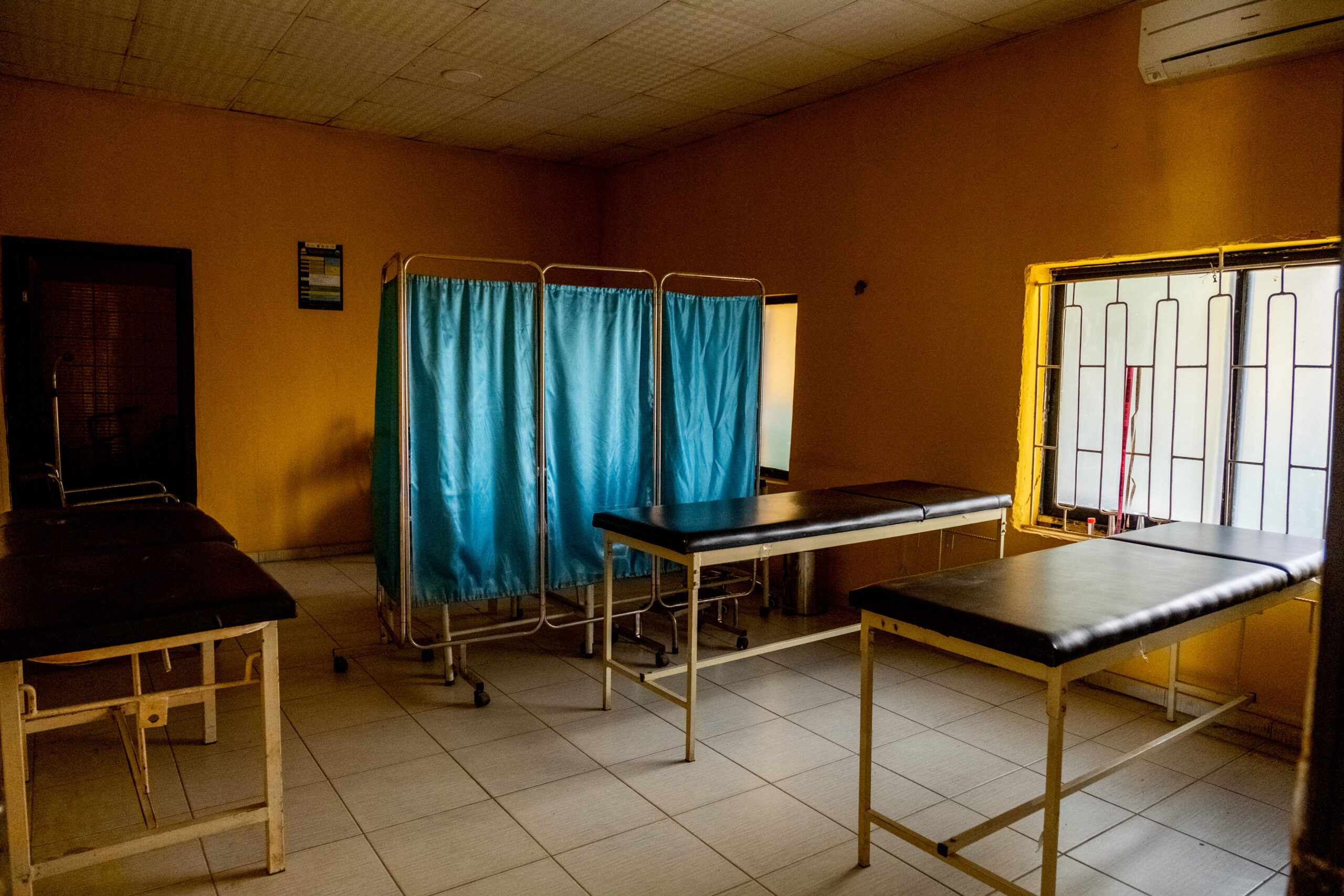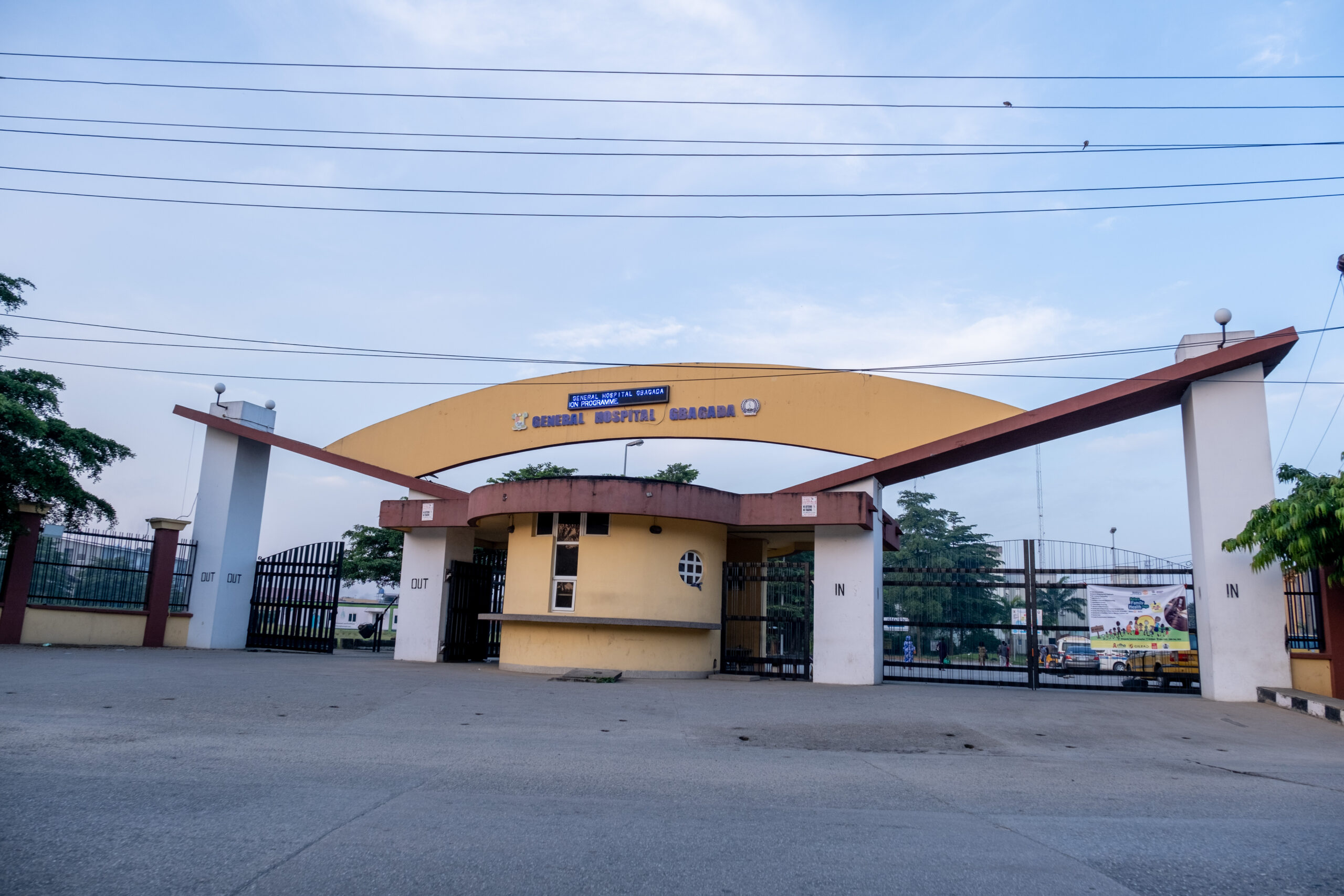This series was supported by the Pulitzer Center and produced in partnership with the nonprofit newsroom Type Investigations, with additional support from the Gertrude Blumenthal Kasbekar Fund and the Puffin Foundation.
LAGOS, Nigeria — T. spent the many waves of COVID-19 working at a pediatric care facility in Lagos, the largest city in Nigeria and the country’s epicenter of the pandemic. The work was exhausting and stressful, particularly after the government required healthcare workers to put in 24-hour shifts, as a way of minimizing movement in the locked-down city. “We didn’t kick against it,” said T., who asked that her full name not be used, for fear of retaliation from her employer or the public. “We saw it as a means to protect patients.”
She hoped the sacrifices nurses made, and the risks they took during the crisis, would lead to better pay and working conditions. Instead, Nigeria’s healthcare facilities continued to deteriorate. T. said she would go to work with a few naira in her pocket, because she and her colleagues often pooled their money for patients who couldn’t pay for treatment. “It’s a sad thing if you have a patient on your bed who can’t afford medication,” T. said.
She even found herself in a similar situation following a motorcycle accident. The day T. and I met, gauze covered a cut on her right cheek, and a shaved patch of hair revealed where a doctor had stitched up a head wound. With her meager salary, however, she couldn’t afford a CT scan. If she caught an infectious disease, she feared she wouldn’t be able to afford the necessary treatment.
“My safety means nothing to them,” T. said of Nigeria’s public officials. “The government is not concerned about me.”
The pressures within Nigeria’s health system have primed its nurses to leave the country. When advertisements for nursing jobs in the United States, United Kingdom, and other countries started circulating on Facebook, in WhatsApp groups, and by word-of-mouth during the pandemic, it opened a pathway for Nigerian nurses like T., who began to see a different kind of career for themselves, and a different kind of life.
Since the start of the pandemic, thousands of healthcare workers have left Nigeria to take jobs in other countries, according to the Nursing and Midwifery Council of Nigeria. This exodus of nurses is making an already weak system weaker, increasing the burdens on the nurses left behind and leaving them exhausted, burned out—and looking for a way out too.
T. said she was concerned about the thinning nursing workforce in Nigeria’s hospitals, but she had to put her own needs, and the needs of her family first. “If I can give my mom a better life,” she said, “I will do that.”
Around the world, COVID-19 and the burnout it caused among health workers have intensified a global bidding war for nurses, as rich countries attempt to shore up their depleted healthcare workforces. Tens of thousands of nurses from Nigeria, India, the Philippines and other nations moved overseas during the pandemic to pursue new opportunities in the US and Europe.
For some nurses, taking a job in a foreign country can provide better pay and working conditions, as well as opportunities for further education and career advancement. However, a year-long investigation by Quartz in partnership with Type Investigations, with support from the Pulitzer Center, found that the migration boom is also exposing nurses to abuse and exploitation, and exacerbating imbalances in the global healthcare system.
The increased demand for healthcare workers in the US and Europe has drained nurses from the already rickety healthcare systems of countries that can least afford to lose them. Some of those countries, such as the Philippines, have a long history of training nurses to work abroad. But the high rate at which nurses moved overseas during the pandemic left local hospitals and other healthcare facilities severely short staffed, limiting their ability to care for patients. Other countries were already facing a crisis in staffing their healthcare systems. In Nigeria, for example, decades of underinvestment and chronic corruption helped create dire shortages of nurses and caused hospital conditions to deteriorate.
A desirable pool of English-speaking healthcare workers
Despite the deprivations of its healthcare delivery system, Nigeria educates a robust workforce of English-speaking graduates, including nurses and doctors, making them desirable workers in the US, UK, Canada, and the Gulf countries.
The number of Nigerian nurses in the UK has exploded, for example, more than doubling between March 2021 and March 2023, according to the UK’s Nursing and Midwifery Council. The effect in Nigeria, meanwhile, is fewer, more exhausted nurses delivering less care, creating a negative feedback loop of worsening conditions for nurses that push even more to leave.
A supervisor at one of Nigeria’s largest public hospitals says the exodus of nurses has left Nigeria at a turning point. “Hospitals are tilting into jeopardy,” he said. “Morbidity and mortality rates are going to increase.”
Nurses who work in Nigeria’s public healthcare facilities risk government reprisals for speaking with the press. Quartz and Type Investigations have therefore granted anonymity to nurses and other health care workers interviewed for this story, or have identified them by their first names or initials, according to their preferences, unless otherwise noted.
What happens to ethics in an emergency
Nigeria is Africa’s largest economy, yet it has some of the world’s worst health indicators. According to the World Bank, average life expectancy in Nigeria as of 2021 stood at 53 years, tied with Chad and Lesotho for the lowest life expectancy globally, and well below sub-Saharan Africa’s average of 60 years. More children under five die in Nigeria than almost anywhere else, and the country ranks in the bottom three globally for maternal mortality, performing worse than Somalia, a country devastated by civil war since 1991.
Widespread measures to address malnutrition, improve basic hygiene and sanitation, and deliver consistent prenatal care—simple interventions with high payoffs—are currently beyond the capacity of Nigeria’s health system.
Such outcomes are exactly why the WHO adopted guidelines governing international nurse recruitment, which are designed to protect countries with vulnerable health systems.
“That nurse is more needed here than in the UK, when you look at it from whichever angle,” said Martin Chabi Joseph, a medical officer at the WHO, who is based in Abuja, Nigeria’s capital.

In Nigeria, communities struggle to access care in a crumbling health system. Image: Damilola Onafuwa/Quartz
The WHO’s guidelines emerged following a wave of international nurse migration in the early 2000s, which made it clear that the unchecked flow of healthcare workers from developing countries to richer ones was a major driver of health inequity globally.
In poorer countries that healthcare workers had left, studies have found evidence of increased child mortality, fewer services, and longer lines to access healthcare, leading some patients to not seek care at all. As migration weakened a country’s healthcare system, the increasing pressure pushed more health workers to seek jobs outside of the public sector.
“At the heart of each and every health system, the workforce is central to advancing health,” the WHO wrote in its 2006 World Health Report. “There is ample evidence that worker numbers and quality are positively associated with immunization coverage, outreach of primary care, and infant, child and maternal survival.”
Such findings sparked calls for the international community to step in. In 2010, after years of negotiation among the United Nations’ member states, the WHO adopted the Global Code of Practice on the International Recruitment of Health Personnel, created to encourage the ethical recruitment of healthcare workers and mitigate the impact of migration on the countries left behind.
According to these principles, countries should ensure that healthcare workers who choose to migrate are treated fairly. Destination countries like the UK and the US are encouraged to provide technical and financial support to the countries sending their workers overseas, in order to bolster the sending countries’ healthcare systems. And while the code emphasizes that healthcare workers should have the freedom to make their own decisions and pursue job opportunities abroad, it explicitly states that recruitment from nations with vulnerable healthcare systems should be avoided.
“Member States should discourage active recruitment of health personnel from developing countries facing critical shortages of health workers.”
WHO guidelines on international recruitment of health workers
To support these goals, in 2020 the WHO drew up a list of 47 countries with “the most pressing health workforce challenges,” whose healthcare systems needed to be safeguarded. In 2023, the WHO updated the list to include 55 countries. Nigeria appears on both lists.
The WHO’s global code of practice is non-binding, however, with no enforcement mechanism. And for developed countries during the pandemic, concerns about the impact of nurse migration on poorer nations seemed to take a back seat to the crisis unfolding at home.
US hospitals also are a major recruiter of Nigerian nurses
The US does not have a formal policy regarding the ethical recruitment of international nurses, but as a member of the UN, it is party to the WHO’s guidelines.
CGFNS International, a Philadelphia-based organization that assesses international nursing credentials, received more than 17,000 visa applications to the US from October 2021 to September 2022, with 3% from Nigeria. In an email, a spokesperson from the State Department said the agency takes allegations of labor exploitation, worker abuse and fraud seriously, but referred questions about the recruitment of healthcare workers from overseas to other agencies. The Department of Homeland Security (DHS) did not respond to requests for comment, while DHS’ US Citizens and Immigration Services and the Department of Labor each said overseeing recruitment was the other department’s responsibility.
The UK, for its part, has its own code of practice governing the international recruitment of healthcare workers, which is based on the WHO’s guidelines. It maintains a list of ethical recruitment agencies, as well as a “red list” of countries based on the WHO’s list that should not be recruited from.

People queue for hours outside a visa processing center in Lagos. Image: Damilola Onafuwa/Quartz
Pressures within the UK health system have led the country to turn heavily to international recruitment. In 2019, the government set an ambitious goal of increasing the number of registered nurses in NHS England by 50,000 by the end of March 2024. But as record numbers of NHS nurses quit during the pandemic, and as Brexit has made the UK less attractive for nurses from EU countries, achieving that goal became more challenging.
To fill the nursing ranks, the UK government has allocated millions of pounds to international recruitment and created a new visa that fast-tracks applications. Between April 2021 and March 2022, 48% of new hires in the UK came from abroad, the highest proportion in two decades.
India and the Philippines, which are not on the UK’s red list, are the top sources of nurses coming to the UK. But the number of nurses from red list countries also increased—by 10-fold between March 2019 and March 2022, according to an analysis by the Royal College of Nursing of data from the UK’s Nursing and Midwifery Council.
Nurses from a total of 14 red list countries were hired in that period, the analysis found, with hiring from Nigeria far outpacing all other red list nations. Between April 2019 and March 2020, 276 Nigerian nurses joined the UK healthcare sector. Between April 2021 and March 2022, that number jumped to 3,010.
The UK continues to hire aggressively from abroad. In September, NHS England announced another round of funding for international recruitment.
The UK Department of Health and Social Care declined to provide details on how the government manages recruitment from specific countries. A representative for NHS Employers, the organization that assists NHS England in developing and employing a sustainable workforce, wrote in an email that recruitment from Nigeria is not permitted, but that Nigerians can apply for jobs with the NHS if they choose to.
Howard Catton, CEO of the International Council of Nurses, a Geneva-based federation of nursing unions, said the lack of transparency around international recruitment efforts may be masking the kind of activity the WHO’s code has deemed harmful. “I’m concerned that there are recruiting practices going on which fall well short of what we expect in terms of respecting the WHO Code,” Catton said, “which ultimately seriously risks exacerbating inequalities that exist already.”
A cycle of migration and deterioration
The nurses who work at the single-story hospital in Northern Lagos are well aware of the hardships that Nigeria’s healthcare workers have had to endure.
Outside the hospital, the streets were full of life when we visited, as three-wheeled passenger kekes rocked their way out of deep potholes in the red dirt streets. Wooden stalls sold pyramids of tomatoes, smoked catfish piled into baskets, and stacks of fuzzy yams the size and shape of swaddled infants.
But inside, the facility was bare. “There’s no impress,” said O., a 55-year-old public health nurse, referring to the money the government is meant to provide to maintain operations. “There’s no office. There’s no table. There’s no chair.”

An empty ward in a primary health care center in Lagos. To maintain the anonymity of the nurses interviewed, Quartz has not photographed the hospitals where they work, while this ward is similarly bare, it is not the same hospital as described in the text. Image: Damilola Onafuwa/Quartz
Without money for petrol, she couldn’t power up the generator. She and her colleagues often worked by the light of solar-powered lamps.
After the first waves of the pandemic, some additional nurses were hired at the hospital. But they eventually left for jobs abroad, a path O. is trying to follow. Other Nigerian nurses complained of a lack of basic equipment, from stethoscopes to heart rate monitors and oxygen tanks. Appropriate medication was hard to come by, as was hand soap, disinfectant, and even water.
And there simply aren’t enough nurses. A., a nurse at another hospital who has worked across Nigeria’s healthcare system, said she sees the job of four or five nurses now being done by one. “Some of the patients understand, or pity us,” A. said. “Most of the patients are upset.”
Fighting “medical brain drain”
In Nigeria, the government has sought to downplay the scale of healthcare worker migration. “First of all, this is not really an exodus,” doctor Osagie Ehanire, the minister of health, told reporters in January. “The very high workforce mobility of health workers is global. Doctors are moving, nurses are moving everywhere.” He cited Ghana as another country where healthcare workers are taking jobs abroad. “They are losing doctors. There’s high mobility in the health sector globally, internationally.”
“We should not knock ourselves as if we are the only victims on Earth, no,” Ehanire said.
In 2022, Ehanire also insisted that Nigeria has enough doctors, despite the WHO’s assessment of the country’s workforce challenges. Yet a bill restricting doctors and dentists from migrating within the first five years of their professional practice was recently under consideration by Nigeria’s House of Representatives before being rejected by the federal government.
In January 2022, after nurses threatened to strike over pay and poor working conditions, the Lagos State government agreed to a monthly retention bonus—an amount the national nurses union said was not sufficient to prevent nurses from quitting. Data on the Nigerian health system is unreliable, and estimates for the number of nurses that have left Nigeria in recent years vary. The Nursing and Midwifery Council of Nigeria reported that some 7,000 nurses left in the first nine months of 2021.
The government has also resorted to more forceful methods to discourage healthcare workers from leaving the country. In 2021, when Saudi Arabia held a recruitment drive at a hotel in Abuja, Nigerian doctors, eager to work abroad, crowded outside. Local news reports say they were forcibly dispersed by Nigerian state security, leading to the cancelation of the event. Shortly afterward, a spokesperson denied that Nigerian state security forces were involved in dispersing the doctors.
The Nigerian health minister did not respond to several requests for an interview.

The exterior of a hospital in Lagos. To maintain the anonymity of the nurses in the story, Quartz has not photographed the hospitals where they work. Image: Damilola Onafuwa/Quartz
According to Joseph, the WHO medical officer in Abuja, restricting migration is not likely to work. Preventing a nurse or doctor from leaving the country does not guarantee that they will continue to work in a broken system. In order to convince nurses to remain in their jobs, Joseph said, the health system itself needs to be improved.
“At the end of the day,” Joseph said, “if we could maintain skilled healthcare workers in good numbers at the facility level, we will change things dramatically.”
As part of the code of practice, the WHO encourages countries to provide technical assistance and financial support to developing countries and countries with economies in transition. Every three years, the WHO asks member states to fill out self-monitoring questionnaires, in order to track the steps that countries are taking to ensure that international recruitment is sustainable, and that poorer nations are receiving the support they need.
In the most recent assessments, submitted in 2021 and 2022, Nigeria indicated that it had not received any assistance, technical or financial, from the UK or any other country. Nor had the Philippines or India, despite the three countries being the source of 76.8% of the UK’s international nursing and midwifery workforce as of March 2023.
Since then, the UK Department of Health and Social Care has provided £2 million in financial aid to Nigeria, and £2.5 million to Kenya and Ghana. In Nigeria, the fund will be managed by the WHO’s local office, which will work with the Nigerian Health Ministry to strengthen the workforce to meet demand and improve policy and planning.
In its 2022/23 budget, the UK government allocated an additional £5 million to strengthen the healthcare workforce in lower- and middle-income countries. (The Nigerian health ministry did not respond to a request for comment on these investments.) In the Philippines, the UK government supported a program that has trained 250 healthcare workers in one city in diagnosing gestational diabetes.
A “political choice” by countries receiving nurses
The recent investments will have to catch up to entrenched imbalances that have been building up for years. “Countries like the United States and the United Kingdom have made a policy and political choice to educate fewer nurses than they need to meet their population health demands and as a consequence need to recruit from other countries, most of whom have much weaker health systems than their own,” said Catton at the International Council of Nurses.
“We need to see more tangible evidence of giving back, for example investing in the building [of] a new hospital or contributing to training programs,” Catton added, calling on the handful of countries with the highest levels of nurse recruitment to invest in the countries they are recruiting from.
In May 2022, the WHO issued a warning to countries to “renew their individual and collective efforts” to support the ethical and sustainable migration of healthcare workers, noting that the increased demand for international nurses, doctors, and other personnel could have negative consequences for countries with vulnerable healthcare systems.
James Campbell, director of the WHO’s Health Workforce Department, which oversees the implementation of the global code of practice, said that in the rush to plug the holes in their own healthcare systems, high-income countries haven’t done enough to support and safeguard poorer nations.
“We can see exactly that unfolding: ‘My needs are greater than yours, and I can pay for it,’” Campbell said.
Nurses are left to find solutions for a systemic problem
The WHO’s guidelines emphasize that, with proper coordination, the international migration of healthcare workers can help strengthen healthcare systems around the world. Countries should work to facilitate the “circular migration” of healthcare workers, the guidelines suggest, bringing skills and knowledge to both destination and source countries.
Many Nigerian nurses want to see their country’s health facilities thrive, and have plans to give back to the system they are leaving behind. “We’re not leaving because we don’t love Nigeria,” said T., the nurse at the pediatric center.
O., the public health nurse, hopes to retire back in Lagos and start an NGO to help orphans and widows. Josiah Jackson-Okesola and his wife Elizabeth, who are now living in the UK and working as nurses, helped to launch a startup focused on education and professional development, which hopes to train 100,000 African workers to join the nursing and healthcare sector in five African countries, including Nigeria. One young Nigerian nurse who is now in the UK said he dreams of using his earnings there to open a foundation that could provide financial assistance to nursing students in Nigeria, so they wouldn’t have to struggle through school like he did.
Ultimately, however, the task of making the system work for Nigerians, and for the people who work in it, is not up to the nurses, T. said. It requires changing the whole system. If they are going to remain in the country and continue to work in healthcare, Nigeria’s nurses need higher pay, better representation in day-to-day decision making, and more respect. “Government needs to see to that,” T. said.
“I want a world in which a nurse in the UK will apply to come to practice in Nigeria,” T. said. Until then, she’s applying to work in Canada.
Additional reporting by Ibanga Isine.